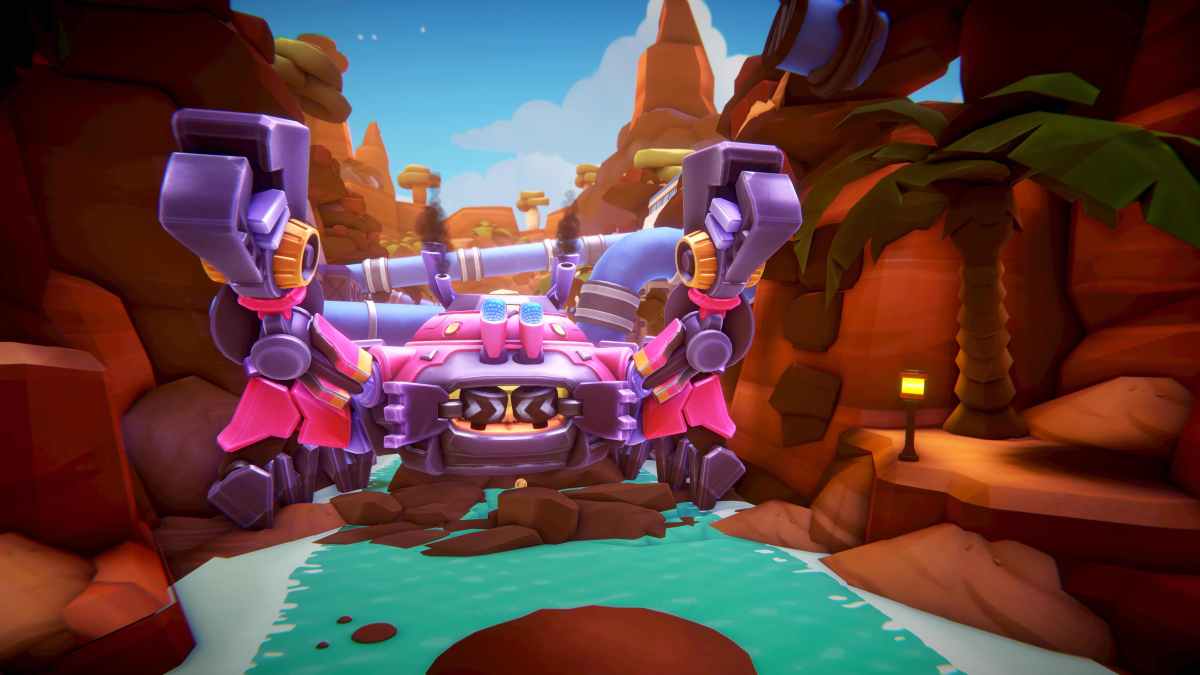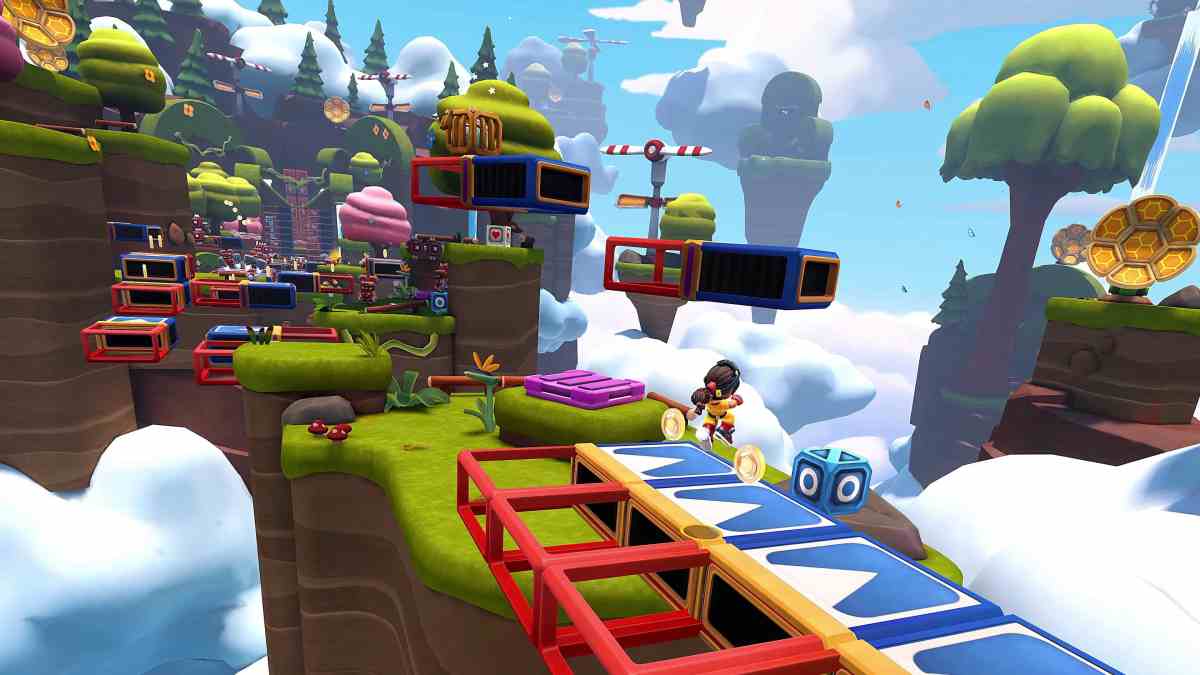It’s no secret that Australians make great video games. In recent years, we’ve seen global hits with the likes of Untitled Goose Game, Unpacking, and Cult of the Lamb, each of which has aided the profile of talent working in the region. But while traditional games have claimed the bulk of praise in recent years, VR games have also quietly grown in scope and ambition, in the same period.
Toast Interactive is one of the companies leading a major push for new Australian-made VR experiences, with its work on titles including Richie’s Plank Experience and adventure game Max Mustard pushing the medium forward.
“Sometimes 20% of the world’s top-selling VR games are made in Australia – and most of them, in Queensland,” Richard Eastes, Co-Founder & Creative Director at Toast Interactive told GamesHub. “We have a high, high concentration of people into VR here.”
Eastes himself discovered the excitement of the medium seven years ago, on a honeymoon trip to Japan. He tried virtual reality on this trip, and was inspired to begin experimenting with the tech, using his background as a hobbyist game developer as leverage. He’s now helping to lead Toast Interactive into a brighter future, defined by developments in VR technology.
“The more you think about it, the more you realise virtual reality will be around for the rest of human civilisation, in some form,” Eastes said. “And we get to see the start of it.”
Read: Chaos Theory wants to transform the world of ‘serious games’
As Eastes told GamesHub, virtual reality technology is entering a period of maturity, after years in its early stages, where it was largely treated as a gimmick. By now, most people interested in VR will have some knowledge or experience with the technology – whether that’s through an arcade ride, faux phone VR, or owning a personal device.
It’s now more accessible, more approachable, more widely available – and for Eastes, it now represents an opportunity to connect with audiences through more engaging, immersive worlds.
Hey Toast Interactive, pass the (Max) Mustard

Toast Interactive’s latest game, Max Mustard, is a product of years of tinkering and pushing at the bounds of VR games. In the adventure, players take the role of intrepid explorer Max Mustard, as they make their way through virtual obstacle courses, in third-person. The game is already available on Meta Quest, and is coming to PCVR and PlayStation VR2 in future.
According to Eastes, the idea for the game came from being told what not to do, in a typical display of Australian stubbornness and persistence.
“I was at a VR conference in LA, and the professional speaker was saying that all VR games have to be first person, and I thought it was odd,” Eastes said. “I didn’t think much of it. And then on the flight home, I was playing Mario Odyssey. Now, I noticed you have to use the right thumbstick to move the camera, and I thought ‘this would be even better in VR, if you didn’t have to use the right thumbstick – you just have to turn you head and watch.'”
“So, we made a prototype, and it felt great. [We] had two people work on a prototype, and two years later, there’s now 30.”
The process for creating the game was fairly delicate, due to the nature of virtual reality. As Eastes told GamesHub, creating VR games is a lot like traditional game development, but with layers of additional challenge on top – you must be aware of the potential for player motion sickness, and ensure the action takes place in a sequence that will acceptable to the human brain.
Read: A PSVR2 review from a motion sickness sufferer
“If your eyes tell you that you’re moving and your body’s not … you can feel sick, and not every movement is equal. If the camera rotates [the wrong way] you can get sick very quickly. If it rotates left and right, it’s not too bad. Moving straight ahead and forward in a straight line, without turning, is the easiest one for the body to handle. So that means you should design all your levels straight ahead … all of our levels have that in mind.”
Traditional games vs. virtual reality

Despite these quirks, Eastes still believes the leap from traditional games to VR games isn’t particularly significant. There are hurdles to cross for comfort, but the basics of game creation remain the same. Max Mustard is novel for its immersion, but virtual reality serves as a means to better engage player senses, and create a world that is full of wonder. VR, in its current form, simply allows for engagement on a new level, while evoking the same deep emotions you’d find in more traditional games.
Eastes started his VR game development journey through a process of trial and error, relying on his hobbyist experiences in game jams and prototyping to learn more about the medium, and the relationship between traditional and VR games.
“No one has more than 10 years experience at this, because it’s so new,” Eastes said. To develop his skills, he relied more on observed knowledge, rather than studying other games – it was about analysing the movements people make in the real world, and how everyday tasks occur.
“Instead of studying games, it’s studying the real world. Things like when you pick up objects … We didn’t have to think about how a user should do it – you just do it like the real world. So, in some ways, it’s actually easier [to develop] in virtual reality.”
Read: Meta Quest 3 Review – This Is The One
Eastes believes that makes VR games very approachable for all developers, regardless of their expertise. It’s why Toast Interactive makes a point to recruit new developers with all sorts of backgrounds – and not necessarily specific VR experience. After all, VR games still have plenty of room to grow. Wide-eyed experimentation and fresh ideas are best for crafting compelling new adventures.
“The best thing [developers] can do is install Unity, type their VR headset in, open it up with the base demo, and start playing with it,” Eastes said. “Follow the YouTube videos. Let them learn to code. That’s all you need to do it … we don’t necessarily hire people with VR experience. If they’ve had good game development experience, we know their skills will translate well.”
The path ahead
In development of Max Mustard, Toast Interactive was – like many other developers in Queensland – supported by funding from Screen Queensland. Per Eastes, this process enabled the expansion of Toast Interactive, and the discovery and retention of new talent.
Australia has, for years, been subject to a degree of talent drain, as game developers are forced to move overseas to find steady work. With initiatives like Screen Queensland’s game development funding, local talent can be supported to grow their skills, and ensure VR games have a home in Australia.

Image: Toast Interactive
“It’s just growing and growing,” Eastes said of the VR industry. “Every time a new headset comes out, there’s another wave of growth … an increase in the number of people that commit to it, longer term … I made a prediction five years ago that VR will be bigger than AR (Augmented Reality) for the next 10 years … and I still stand by that.”
While adoption rates have fluctuated in recent years, and price remains a barrier for many people interested by VR, there is a future where the technology becomes an important part of day-to-day business and play. To that end, the work of Toast Interactive and other VR game developers in Australian remains essential. As does supporting their output.
In the coming months, the Toast Interactive team is looking to the release of Max Mustard on new VR devices, while also working on unannounced projects, with an aim to innovate within the VR space. As interest in VR continues to grow, the studio – and its fellows in Queensland and wider Australia – is very well positioned to embrace its status as a leader in the global future of VR games.
Toast Interactive’s Max Mustard is now available on Meta Quest devices. It launches for PC and PlayStation VR2 in the near future.
Essential Casino & Betting Guides
Looking for the best casinos or betting sites? Below you’ll find our recommended guides that players love right now.





